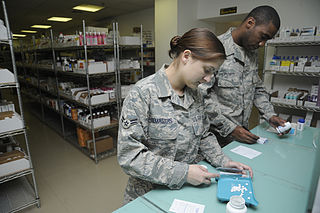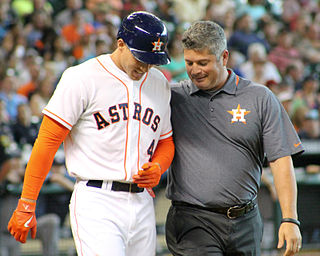Related Research Articles
A dietitian, medical dietitian, or dietician is an expert in identifying and treating disease-related malnutrition and in conducting medical nutrition therapy, for example designing an enteral tube feeding regimen or mitigating the effects of cancer cachexia. Many dietitians work in hospitals and usually see specific patients where a nutritional assessment and intervention has been requested by a doctor or nurse, for example if a patient has lost their ability to swallow or requires artificial nutrition due to intestinal failure. Dietitians are regulated healthcare professionals licensed to assess, diagnose, and treat such problems. In the United Kingdom, dietitian is a 'protected title', meaning identifying yourself as a dietitian without appropriate education and registration is prohibited by law.

A pharmacy technician performs pharmacy-related functions. Training, certification, licensing, and actual practice of pharmacy technicians varies not only worldwide but in some countries regionally as well as by employer.

A surgical technologist, also called a scrub, scrub tech, surgical technician, or operating department practitioner or operating room technician, is an allied health professional working as a part of the team delivering surgical care. Surgical technologists are members of the surgical team. The members of the team include the surgeon, surgeon's assistant, circulator nurse and anesthesia provider. They possess knowledge and skills in sterile and aseptic techniques. There are few mandatory professional requirements for surgical technologists, and the scope of practice varies widely across countries and jurisdictions. Surgical technologists attend junior colleges and technical schools, and many are trained in military schools. In the military they perform the duties of both the circulator and the scrub. The goal is for surgical technologists to be able to anticipate the next move the surgeon is going to make in order to make the procedure as smooth and efficient as possible. They do this by having knowledge of hundreds of surgical procedures and the steps the surgeon needs to take in order to complete the procedure, including the very wide range of surgical instruments they may need. Specialties can include, but are not limited to, the following: genitourinary, obstetrics and gynaecology, urology, ENT, plastics, general, orthopedics, neurology, and cardiovascular. They only work in surgical or perioperative areas and are highly specialized. Surgical technologist is the proper term for a two-year program which earns a degree in applied sciences. The profession is up and coming and highly in demand.

An athletic trainer is a certified and licensed health care professional who practices in the field of sports medicine. Athletic training has been recognized by the American Medical Association (AMA) as an allied health care profession since 1990.
A medical assistant, also known as a "clinical assistant" or healthcare assistant in the US is an allied health professional who supports the work of physicians, nurse practitioners, physician assistants and other health professionals, usually in a clinic setting. Medical assistants can become certified through an accredited program. Medical assistants perform routine tasks and procedures in a medical clinic.
The Association for Biblical Higher Education (ABHE), formerly The Accrediting Association of Bible Colleges (AABC) is an evangelical Christian organization of bible colleges in the United States and Canada. It is a member of the International Council for Evangelical Theological Education. The ABHE is interdenominational but requires annual affirmation of a common statement of beliefs. It is headquartered in Orlando, Florida.

A medical laboratory scientist (MLS) or clinical laboratory scientist (CLS) or medical technologist (MT) performs diagnostic testing of blood and body fluids in clinical laboratories. The scope of a medical laboratory scientist's work begins with the receipt of patient or client specimens and terminates with the delivery of test results to physicians and other healthcare providers. The utility of clinical diagnostic testing relies squarely on the validity of test methodology. To this end, much of the work done by medical laboratory scientists involves ensuring specimen quality, interpreting test results, data-logging, testing control products, performing calibration, maintenance, validation, and troubleshooting of instrumentation as well as performing statistical analyses to verify the accuracy and repeatability of testing. Medical laboratory scientists may also assist healthcare providers with test selection and specimen collection and are responsible for prompt verbal delivery of critical lab results. Medical Laboratory Scientists in healthcare settings also play an important role in clinical diagnosis. An estimated 70% of medical decisions are based on laboratory test results and MLS contributions affect 95% of a health system's costs.
The National Healthcareer Association (NHA) is a national professional certification agency for healthcare workers in the United States. Granting credentials in more than 8 allied health specialties, it is an organizational member of the National Organization for Competency Assurance (NOCA). The National Healthcareer Association partners with educational institutions nationwide with over 350,000 certified individuals. It is one of the largest certification and continuing education providers. The National Healthcareer Association works with health training institutions, hospitals, unions, and the US Defense Department through DANTES; it has approved over 2400 training/testing locations throughout the US and in several countries. These institutions offer allied health programs and use the national certification as their "End Of Program Credential." Healthcare professional certification is different from a license such as a Registered Nurse, or a licensed practical nurse. Although certification is not state mandated and/or regulated in all 50 states, most employers and industry organizations prefer their employees to be certified.

Fox College is a Private for-profit college with its main campus in Tinley Park, Illinois. It originally was founded in 1932, and most students come from the Chicago area. Fox College awards associate degrees.
Commission on Accreditation of Allied Health Education Programs,, is an accreditation agency for postsecondary education programs in 30 health science fields.
American Career College is a private, for-profit vocational college offering associate degrees, diplomas, and certificates in healthcare programs. It has campuses in Los Angeles, Ontario, and Anaheim, California, all accredited by the Accrediting Bureau of Health Education Schools. It is a member of the California Association of Private Postsecondary Schools.
Higher education accreditation in the United States is a peer review process by which the validity of degrees and credits awarded by higher education institutions is assured. It is coordinated by accreditation commissions made up of member institutions. It was first undertaken in the late 19th century by cooperating educational institutions, on a regional basis.

Mayo Clinic School of Health Sciences (MCSHS), formerly known as Mayo School of Health Sciences (MSHS), is an accredited, private, nonprofit school of higher education specializing in allied health education. MCSHS operates within the Mayo Clinic College of Medicine and Science, which is the educational division of Mayo Clinic. As such, MCSHS is fully integrated with Mayo Clinic hospitals and clinics.
The Pima Medical Institute (PMI) is a private for-profit medical career college that trains students for careers as allied health care professionals with campuses throughout the western United States. PMI is the largest independently owned, private allied health school in the U.S. and is nationally accredited by the Accrediting Bureau of Health Education Schools (ABHES).

Nevada Career Institute is a for-profit technical college in Las Vegas, Nevada. Nevada Career Institute is owned and operated by the Fuerst family of Success Education Colleges.
CNI College is an allied health vocational college in Santa Ana, California. The main campus is located in the City of Orange.
Ultimate Medical Academy (UMA) is a nonprofit career education school that grants associate degrees and training in the allied health field. The institution also provides continuing medical education (CME) to more than 30,000 physicians, nurses and other medical professionals annually.
Gurnick Academy is a private for-profit higher-education institution in California providing nursing, imaging and allied health programs. The school’s corporate office is located in San Mateo, California, and it operates six campuses, in San Mateo, Concord, Modesto, Fresno, Sacramento and Los Angeles as well as offering distance education online. The academy is operated and owned by the Gurnick Academy of Medical Arts, with Konstantin Gourji serving as the chief executive officer.
Southeastern College is a private institution of higher learning with campuses in Miami Lakes and West Palm Beach, Florida.
References
- ↑ Specialized Accrediting Agencies Archived 2009-05-08 at the Wayback Machine , US Department of Education (accessed March 31, 2008)
- ↑ "Healthcare Accrediting Agencies". Guide to Healthcare Schools. Retrieved 7 December 2012.